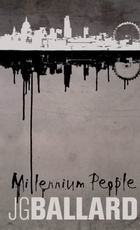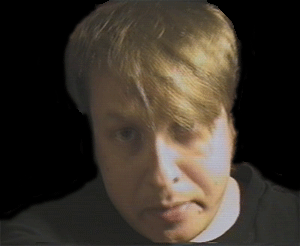
I just read the British writer J.G. Ballard's two books, Cocaine Nights (1996) and Millennium People (2003) in a row. Last year I was very impressed by Ballard's Super-Cannes (2000) which he wrote in between these two mentioned books, and all three can be even seen as a sort of a trilogy.
Even though Cocaine Nights as such is a fine book, I read it merely as a sketch for the themes and ideas Ballard fully and wonderfully developed only in Super-Cannes, the similarities between two books being remarkable; both taking place in the Mediterranean area and depicting the "discreet charm of the bourgeoisie" (as it was known in Luis Buñuel's satirical/surreal treatment), when the boredom and ennui of upper-middleclass professionals leads into a psychopathology of senseless violent outbursts chronicled in the form of a quasi-detective story.
Instead, in Millennium People Ballard returns back to his native England, where the writer, nevertheless, depicts again the violent underbelly hiding underneath the well-organised surface of Western bourgeois and middle-class civilisation.
Millennium People's narrator David Markham is a psychologist who lives in London's St. John's Wood (a traditional upper-middleclass living area) supported by his wife Sally, a rich man's daughter still suffering from a hypochondriac condition left by a tram accident in Spain, and therefore refusing to give up her walking sticks, now unnecessary; Sally's being crippled being more of a mental than physical sort. David finds out his ex-wife Laura has been killed by a bomb planted in Heathrow airport, and he embarks on a confused journey to find the killer. At the same, London's Chelsea Marina area, a middle-class dwelling place, is in a turmoil, when its residents complain having become "the new poor" under the tightening economical living conditions. David starts infiltrating this subversive movement, learning to know its spokeswoman Kay Churchill, an ex-film lecturer on a crusade against Hollywood, and other outcast figures of the former middleclass. Together they get involved in such (eventually futile) acts as storming the BBC building, burning down the National Film Theatre (Britain's Film Archive), smokebombing video stores, fatal bombing in Tate Gallery, and finally the police siege of Chelsea Marina, a sort of a bourgeois re-run of the 1871 Paris Commune. There is also a paediatrician, Dr. Richard Gould, a benefactor for the fatally ill children whose motives will be found more sinister as the book progresses.
This is another cruel social and psychopathological satire from J.G. Ballard, in the spirit of such fellow sardonic and idealist-as-a-cynic British storytellers as Jonathan Swift (OK, he was actually Irish but a classic of English literature nevertheless), William Golding of The Lord of the Flies and Anthony Burgess of A Clockwork Orange (as famously filmed by Stanley Kubrick).
Ballard's leitmotif going all through his published output seems to be that there's a vast irrational, psychosexual and violent understructure beneath our so called civilized culture -- what could be a more appropriate observation post to this than the (superficially) mild and polite middleclass British mindset where most Ballard's books take place -- and the more we try to suppress it, the more it is only prone to surface. Ballard's message seems to be that despite of boasting our sophisticated technology and advanced culture, we are still savages underneath.
Ballard's vision appears to be all the more crucial against the current political and socioeconomic climate, when even the traditionally stable middleclass has to struggle in the throes of neo-liberalist politics threatening to narrow the living space of anyone else than the ultra-rich elite of society (recent France's and Holland's "No" votes in the referendum about the European constitution were just one symptom of this growing concern). About the backgrounds of this book, Ballard himself said in a November 2003 interview for The Age (Australia) that:
"There is a lot of dissatisfaction among the middle classes today in England, the salaried middle class -- doctors, solicitors, middle managers, civil servants, academics, teachers -- that their salaries have not kept pace with inflation, that they are over-taxed. They have lost a lot of the status they once had, they've lost their job security and the kind of core beliefs that have always sustained the middle class: a sense of civic responsibility, the importance of education. Education is more and more perceived as a sort of con. It deludes the middle class into thinking that they have some sort of special skill. It doesn't guarantee anything. An arts degree is like a diploma in origami. And about as much use.
[...]
You get middle-class people together, and their conversation is dominated by finding schools and thinking about private health care, housing.
[...]
So there's this huge dissatisfaction and it could reveal itself in civil unrest. It could happen. [The middle classes] are the keel and anchor of society. Once their sense of civic responsibility is discarded, everything will collapse, literally. Water won't run through the taps.
[...]
I think the class system has begun to break down. We're in a time of major changes. The huge range of protest movements that we see -- they are the millennium people because they're shouldering the burden of protest. They're aware that something is deeply wrong and that something needs to be done about it."
"Desperate people -- and the middle classes are now desperate, or may soon become desperate - will seek desperate remedies, and desperate remedies to a certain kind of mind have an appeal all their own. It may be that sex is triggered by, or should be -- it's possible -- by strains of violence that are definitely in our make-up."
"These last three books [The Cocaine Nights, Super-Cannes and Millennium People] have all been looking at human psychopathology, which has been fenced off very carefully by all the civilising forces that make up our lives today. This reservoir may appear more and more attractive to all sorts of agencies, from political parties to commercial concerns to religious groups to criminals to philosophers. I mean, this has happened before in history many times. The last occasion was, of course, the German Nazi party, which openly tapped psychopathic strains in human nature to create a vast sadistic ideology."
"In a totally sane society, madness is the only freedom, and the more civilised we are, the more ruled by reason, the greater the unconscious need for some sort of irrational outbreak grows within us. But the fathers of the Enlightenment never accepted that.
[...]
The Enlightenment view of mankind is a complete myth. It leads us into thinking we're sane and rational creatures most of the time, and we're not."
Links:
Millennium People @ andthegoat.com
Millennium People @ BBC Collective
Millennium People @ blackstarreview.com
BBC Four Profile of J.G. Ballard
Millennium People @ culturecourt.com
Millennium People @ encompassculture.com
Millennium People @ track0.com
J.G.Ballard.com - an extensive unofficial site
J.G. Ballard Quotes @ researchpubs.com


No comments:
Post a Comment